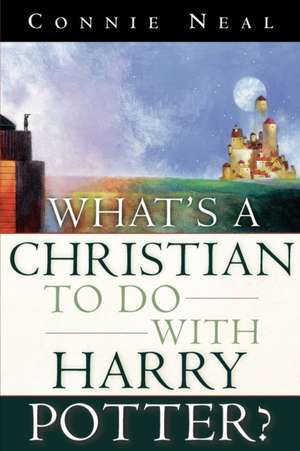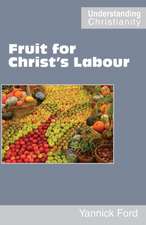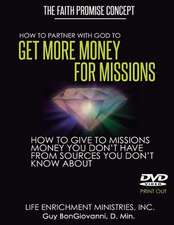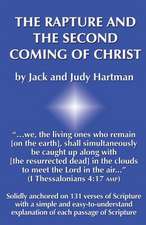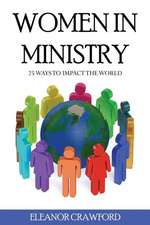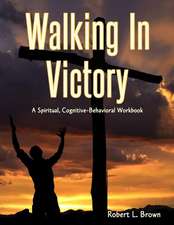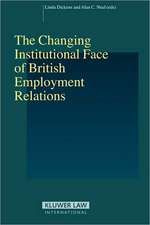What's a Christian to Do with Harry Potter?: Universul Harry Potter
Autor Connie Neal, C. W. Neal, Nealen Limba Engleză Paperback – 30 apr 2001
In the world of publishing, few successes have equaled that of J. K. Rowling’s Harry Potter series—magical stories centered on one boy’s adventures at Hogwarts, a school for witchcraft and wizardry. Yet this popular series presents a perplexing—even divisive—challenge to the Christian community. Although the books present a clear picture of the epic battle between good and evil, they appear to support the use of magic and have had a controversial impact on our culture. As a result, many of us are wondering, “How should I respond to this Harry Potter thing?”
Find out what the Harry Potter books really say about witchcraft and wizardry.
Hear what Christians on both sides of the debate are saying about Harry Potter—and decide what you believe.
Learn how you can use the series to protect your child from real occult influences.
In What’s a Christian to Do with Harry Potter?, you’ ll explore the valid concerns some Christians have about the series, sort out the fact and fiction at the center of the debate, discover biblical answers that may surprise you, and learn how you can tap into this powerful cultural phenomenon to help advance the kingdom of God.
This book has not been prepared, approved, or licensed by any person or entity that created, published, or produced the Harry Potter books or related properties.
Din seria Universul Harry Potter
-
 Preț: 83.61 lei
Preț: 83.61 lei -
 Preț: 38.25 lei
Preț: 38.25 lei - 22%
 Preț: 93.09 lei
Preț: 93.09 lei - 21%
 Preț: 125.13 lei
Preț: 125.13 lei -
 Preț: 116.55 lei
Preț: 116.55 lei -
 Preț: 80.03 lei
Preț: 80.03 lei -
 Preț: 63.15 lei
Preț: 63.15 lei -
 Preț: 90.52 lei
Preț: 90.52 lei -
 Preț: 124.29 lei
Preț: 124.29 lei -
 Preț: 63.97 lei
Preț: 63.97 lei -
 Preț: 133.80 lei
Preț: 133.80 lei -
 Preț: 376.55 lei
Preț: 376.55 lei -
 Preț: 62.56 lei
Preț: 62.56 lei -
 Preț: 141.05 lei
Preț: 141.05 lei -
 Preț: 125.95 lei
Preț: 125.95 lei -
 Preț: 132.76 lei
Preț: 132.76 lei -
 Preț: 124.16 lei
Preț: 124.16 lei -
 Preț: 81.23 lei
Preț: 81.23 lei -
 Preț: 59.16 lei
Preț: 59.16 lei -
 Preț: 64.20 lei
Preț: 64.20 lei -
 Preț: 174.42 lei
Preț: 174.42 lei -
 Preț: 79.97 lei
Preț: 79.97 lei -
 Preț: 63.15 lei
Preț: 63.15 lei -
 Preț: 63.15 lei
Preț: 63.15 lei -
 Preț: 296.68 lei
Preț: 296.68 lei -
 Preț: 54.20 lei
Preț: 54.20 lei -
 Preț: 139.34 lei
Preț: 139.34 lei -
 Preț: 100.83 lei
Preț: 100.83 lei - 22%
 Preț: 798.83 lei
Preț: 798.83 lei -
 Preț: 103.34 lei
Preț: 103.34 lei -
 Preț: 18.57 lei
Preț: 18.57 lei -
 Preț: 91.57 lei
Preț: 91.57 lei -
 Preț: 113.42 lei
Preț: 113.42 lei -
 Preț: 98.37 lei
Preț: 98.37 lei -
 Preț: 78.84 lei
Preț: 78.84 lei -
 Preț: 83.69 lei
Preț: 83.69 lei -
 Preț: 95.63 lei
Preț: 95.63 lei -
 Preț: 128.63 lei
Preț: 128.63 lei -
 Preț: 88.35 lei
Preț: 88.35 lei - 15%
 Preț: 116.58 lei
Preț: 116.58 lei - 8%
 Preț: 553.23 lei
Preț: 553.23 lei -
 Preț: 240.26 lei
Preț: 240.26 lei - 15%
 Preț: 523.07 lei
Preț: 523.07 lei -
 Preț: 338.36 lei
Preț: 338.36 lei -
 Preț: 264.60 lei
Preț: 264.60 lei -
 Preț: 95.76 lei
Preț: 95.76 lei -
 Preț: 236.41 lei
Preț: 236.41 lei -
 Preț: 391.79 lei
Preț: 391.79 lei -
 Preț: 226.50 lei
Preț: 226.50 lei
Preț: 101.77 lei
Nou
19.47€ • 20.33$ • 16.12£
Carte disponibilă
Livrare economică 14-28 martie
Specificații
ISBN-10: 1578564719
Pagini: 224
Dimensiuni: 153 x 228 x 15 mm
Greutate: 0.3 kg
Editura: Waterbrook Press
Seria Universul Harry Potter
Notă biografică
Extras
What Would Jesus do with Harry Potter?
Decide for Yourself
What would Jesus do? This question, posed in the Christian classic In His Steps by Charles Sheldon, has become so familiar as to be reduced to WWJD? But how do we determine what Jesus would do, particularly in the kind of divisive debate where well-versed Christians disagree as they do over Harry Potter? Actually, it is precisely this kind of situation in which the WWJD? question proves most useful. (To take the examination a step further, perhaps you’ll consider the more pertinent question What would Jesus have me do? as you read on.)
In the fictional story In His Steps, a pastor challenges member of his church to take a pledge. For one year they agree to consider what the Bible has to say on the matter, pray about it, ask God for wisdom, seek godly counsel if necessary, them come to their own conclusion on what they believe Jesus would do.
The church members necessarily rely on dictates of conscience, because the question put to them is to be a matter of personal reflection before the Lord. They are not to poll their friends to see what they think Jesus would do. Nor are they to pry into their friends’ business and volunteer their own opinion on another’s circumstance. Once an individual gains a conscientious conviction in answer to the personal question What would Jesus do? he or she pledges to do it regardless of the consequences.
At one point in the story, a man who owns an establishment that sells hard liquor, wine, and beer asks the question. After prayerful consideration of many passages in the Bible that mention wine, he gains a personal conviction that Jesus would not sell hard liquor used primarily to get people drunk. He decides to discontinue the sale of hard liquor but has no such conviction over selling beer and wine.
At a meeting of the people who took the pledge, he is questioned about his decision by a recovering alcoholic. To the alcoholic, beer and wine represent drunkenness, because whenever he takes even one drink he cannot stop himself until he is drunk. The store owner reminds his friend that he has followed the pledge: He prayerfully considered Scripture and came to a personal and conscientious conviction. In this case, as in many of this nature, the personal history of each individual and what the matter means to that person make a difference in each one’s answer.
It follows that each person’s answer would seem the obvious one--in his or her own mind! Considerable adjustments are required to broaden one’s perspective and see that another Christian might not make the same associations and would therefore come to a different decision. It would also take some maturity to see--as is most important for Christian unity--that both decisions, while different in terms of personal boundaries and conduct, could be right before God.
This analogy has significant relevance to the debate about whether Christians should read or allow their children to read or see the Harry Potter stories. You may recall from chapter 3 that whether a person takes a pro or con position depends upon the mental associations that person makes. These positions often reflect the personal experience of the individual. One man even appealed to this as part of his argument, saying, “I know from personal experience that it is not okay.” Who can effectively argue with that?
So it is not surprising that Alan Jacobs, a professor of English at a Christian college, associates Harry Potter primarily with classic literature (see p. 21). For him, the issues are defined by his study of the history of magic and science in literature. Alison Lentini, a writer with the Spiritual Counterfeits Project who has degrees in Romance languages and literatures from Princeton University, also looked at Harry Potter books from a literary perspective (see p. 24). However, before coming to Christ, she was involved in Wicca and neopaganism. She has personal experience with occult practices that correspond to some of the subjects taught as Hogwarts. For her, the issues are defined by her knowledge of occult practices in our world today. Both referred to and compared the Harry Potter books to the Chronicles of Narnia (although I didn’t include those remarks in the excerpts); however, their interpretations of Narnia are also contrary. These two Christian scholars came to entirely different conclusions about Harry Potter. What’s more, both wrote convincing arguments to support their cases for and against the books. Furthermore, I believe both of their conclusions are right--for them!
It’s one thing to see how two people can look at the same work of literature and see two different things. But how can two Christians use the same Bible and come to opposing positions about what is right and still both be right with God? There is biblical explanation for this covered under the heading of disputable matters (found in Romans 14-15 and 1 Corinthians 8-10, which I will address momentarily). In such cases, where cultural, personal, and spiritual issues overlap, individual Christians must finally agree to disagree. Sincere, Bible-believing Christians, who seek the Lord with all their hearts, can be led by the same Holy Spirit to opposing conclusions. This is not relativism nor situational ethics. This is not compromising our commitment to godly conduct under mere social or political pressure. Instead, this is a personal decision about the appropriateness of disputable conduct. Yes, the Bible does allow for such cases.
As we saw in chapter 1, the issues raised over Harry Potter don’t lead to a single “Christian position.” Reading Harry Potter is a disputable matter because we are not debating whether it is okay for Christians to practice witchcraft or cast spells. The Christian position on that is clear. We agree that we should never participate in or practice anything listed in Deuteronomy 18:9-14 (see chapter 7). But reading Harry Potter is not the same as practicing witchcraft or even--as some assert--promoting it. However some can take it to mean just that. Therein lies the disputable part of these issues that Christians debate in earnest.
Asking What would Jesus do with Harry Potter? can be helpful. But it is only useful in dictating personal choice about personal conduct. It loses its usefulness when we turn it into a rhetorical question to tell someone else what Jesus would have them do. The letter to Christianity Today from the twelve-year-old boy that I referred to in chapter 1 (see p. 29) revealed that he had seriously considered the issues in light of God’s Word and came to a definite conclusion that it would be wrong for him to read Harry Potter. He clearly associated reading the books with involving himself in witchcraft, which the Bible forbids. Therefore, it would be sinful for him to do so.
He took his argument a step further, however, when he wrote: “I can’t picture Jesus recommending the Harry Potter series as good reading…It’s so obvious that these books are bad.”
Another letter I read also appealed to the WWJD? question, arguing along these lines: “Do you think Jesus would be proud of a parent who gave his or her child such a book?”
Both are posited as rhetorical questions, because to the fully convinced mind, it is not feasible for any true Christian to answer, “Yes! I definitely could see Jesus recommending the Harry Potter books,” or to suggest, as Christianity Today did, that the books would make great Christmas gifts for Christian kids. As confounding as this may be, it is a fact that when Christians ask themselves What would Jesus do with Harry Potter? they come to conclusions as different as the ones found in In His Steps.
Asking What would Jesus do with Harry Potter? as an open-ended question might elicit some surprising positive responses. Consider these:
·Jesus might read the Harry Potter stories and use them as starting points for parables. He might use kids’ interest in the battle between good and evil to explain the ultimate battle between good and evil.
·Jesus might ask kids what they would see if they looked into the Mirror of Erised and listen attentively as they struggled to put into words the deepest desires of their hearts.
·Jesus might look at the multitudes who love the Harry Potter stories in the same way he looked at the multitude who came to him hungry for food. He might tell his disciples to feed them, giving them what they were hungry for on the surface of things (a great story with supernatural aspects) then offer them what they are truly hungry for--him.
·Jesus might look on the multitudes reading Harry Potter as being like sheep without a shepherd, easily led astray. He might take note of their tendency to wander into pastures that don’t satisfy the deepest hunger of the human soul and warn them of the dangers of venturing off into witchcraft and wizardry in our world just because it might look fun in Harry’s world.
·Just as Jesus noticed and met others’ physical needs, he might attend to the earthly needs revealed in the lives of those who identify with the characters in Harry Potter. He might get them talking about Harry Potter and listen to what they identify with most: neglect, poverty, discrimination, abuse, fears, dreams, the pressures to fit in, desires to accomplish something in life, or the stresses of school. Then he might show them how to deal with such real parts of their lives.
·He might talk about how Harry deeply needed love and encouragement, because the people he was left to depend on failed him. He might listen as kids told him about the times when people they depended on failed them, then offer them the love and encouragement they deeply need.
·He might compare the trustworthy goodness of Albus Dumbledore to the infinitely superior goodness of God the Father, stressing that we can find the same kind of reassurance in God, and godly mentors, that Harry finds in his headmaster.
·He might talk about how Hogwarts was a reality in Harry’s world the whole time, even though Harry didn’t know about it until he accepted the invitation to attend. Then he might tell kids about how his Father’s kingdom is a parallel realm within reach in this world. He might talk about how people walk by the door that leads to the “magical realm” of Hogwarts without ever noticing it for what it is, and compare that to how people pass by the entrance to God’s kingdom (Jesus, who is the door) without knowing what they are missing. He might even show kids that he is the Way (the “magical” transport) to God’s kingdom. He might explain that they can only get in to God’s kingdom by walking in faith, with absolute confidence in that which is unseen, just like Harry and his friends have to walk through the barrier between platforms nine and ten without getting scared or hesitating. Oh, there’s a lot Jesus might do with Harry Potter!
·Jesus, who went to parties with tax collectors and sinners and took flak for it from the religious establishment, might be likely to read a controversial book.
·Jesus might show love and acceptance to the kids who love Harry Potter, never looking down on those who read the books nor casting a sideways glance of disapproval at a kid who wears a Harry Potter T-shirt.
In both cases (positive and negative), WWJD? fails to work as a salvo launched against other Christians who hold a different opinion on a matter of conscience. It only works when individuals who are following Jesus use it to become fully convinced in their own minds.
Moral life in Old Testament times was governed by one rule of guidance: Follow the Law of Moses. The Law regulated every detail of community and personal life: family, diet, personal hygiene, worship, and religious ritual. Since no one could keep the law, much of their religious ritual had to do with blood sacrifices to pay for the times they fell short of keeping the law perfectly.
New Testament believers have a New Covenant, under which the blood of Jesus replaces the need for animal sacrifices. “Come, follow me,” Jesus calls throughout the Gospels. After Jesus rose from the dead, he took Peter aside to reveal what life held in store for him. He told Peter that his life would end in martyrdom and glory to God. Then Jesus said to him, “Follow me!” Peter saw John following them and asked, “Lord, what about him?” Jesus answered, “If I want him to remain alive until I return, what is that to you? You must follow me” (see John 21). So, our lives are no longer primarily governed by trying to follow the Law, but in seeking to follow Jesus.
How do we follow Jesus today? After all, he has ascended back to the Father, Jesus didn’t leave us alone; he gave us the Holy Spirit, who leads us through daily life. Jesus promised, “But the Counselor, the Holy Spirit, whom the Father will send in my name, will teach you all things and will remind you of everything I have said to you” (John 14:26). Later he said, “But when he, the Spirit of truth, comes, he will guide you into all truth. He will not speak on his own; he will speak only what he hears, and he will tell you what is yet to come” (John 16:13). Therefore, when dealing with disputable matters, we follow the leading of the Holy Spirit, aligning ourselves with the Word of God and our own conscience.
This does not mean that we ever disregard or disobey God’s direct commands, such as the clear dictates that we are not to practice witchcraft, divination, sorcery, and the like (which are referred to in the Harry Potter books). It does mean that in subjective matters, including whether it’s okay to read a story with such references, we must employ personal discernment. As much as people on all sides of this debate banter about verses of Scripture, there is no specific passage that says reading about these things in a fantasy story is wrong. It remains a matter of personal discretion.
WHAT SCRIPTURE SAYS ABOUT DEALING WITH DISPUTABLE MATTERS
The Scripture passages we should study in order to effectively deal with the Harry Potter debate haven’t been given much attention lately. These are found in Romans 14-15 and 1 Corinthians 8-10. These passages apply to the kind of culturally relevant and spiritually potent debate in which Christians take opposing positions about personal conduct. Every Christian who has to deal with the Harry Potter controversy would benefit from an in-depth study of these passages.
For our purposes, I will lay out the principles that can guide us as we make decisions about Harry Potter. The text to the left is my paraphrase of Paul’s words. The notations at the right can help you locate the original in your own Bible:
Some Christians’ faith allows them more freedom than others.Rom. 14:1
Some have a conscientious objection on disputable matters. Paul describes those
with stricter limitations as having “weaker faith,” but he does not use this term
in a derogatory way.
The one with greater freedom (in this case, the one who feels comfortable reading Rom 14:3
Harry Potter) must not look down on those whose conscience restricts them.
The one who does not (in our case, read Harry Potter) must not condemn those Rom 14:3
who do.
Each person should be fully convinced in his own mind.Rom. 14:5
We must stop passing judgement on fellow Christians.Rom. 14:1,4,13
Judging implies that they are deficient in Christ. We will all stand before the
Lord to be judged and be held accountable before God for our conduct. Notice
that this directive is not put to one side or the other as are some in this passage.
Paul is saying, “Both sides, stop it!”
Do not cause a fellow Christian to stumble by leading or provoking him to do Rom. 14:13
something contrary to his conscience.
The same behavior can be right for one Christian and wrong for another.Rom. 14:14
Those who have freedom in disputable matters should be sensitive not to distressRom. 14:15-16
Conscientious objectors.
The kingdom of God is not a matter of what we conclude on disputable matters.Rom. 14:17
Instead, it is about righteousness (each of us being right with God in Christ’s
righteousness and in keeping our consciences clean by right conduct as led by the
Holy Spirit), peace (with God and others in the body of Christ), and joy in the
Holy Spirit. The context of this verse makes it clear that they were dealing with
disputable matters that some Christians considered right and others considered
wrong. Therefore, the joy of the Holy Spirit is the joy of a clean conscience and
also the joy of Christian fellowship--which was lost when Christians were caught
up in judging and condemning each other openly.
Make every effort to do what leads to peace and the spiritual building up of Rom. 14:19
Individual Christians and of the church.
Keep your opinions on disputable matters between yourself and God.Rom. 14:20-22
If you have freedom, don’t flaunt it before those who are troubled by what
you do.
Blessed (happy) is the man who does not condemn himself for what he approves.Rom. 14:22
Once fully convinced, enjoy your decision! This is in keeping with the “whatever you
do” verses in 1 Cor. 10:31 and Col. 3:17, 23. If you can read Harry Potter heartily
as unto the Lord and to the glory of God, with all your heart, and commit it to the
Lord as in Prov. 16:3, then be happy about it.
If you have doubts (about Harry Potter), don’t (read it).Rom. 14:23
When in doubt, don’t! If doubts remain, you would be in sin to do whatever you
doubt, because everything that does not come from faith it sin. This is how
something that is not a sin for one person could be a sin for another.
Aim to build each other up in the body of Christ.Rom. 15:2
Do this even if you come to different conclusions about the suitability of Harry
Potter!
Accept one another, then, just as Christ accepted you, in order to bring praise to God.Rom. 15:7
WHEN DID YOU LAST HAVE A ROUSING DEBATE OVER EATING MEAT SACRIFICED TO IDOLS?
Contemporary Christians in Western culture haven’t had to struggle much over whether it’s sinful to eat meat sacrificed to idols, but the first-century church did. That controversy, which is taken up in 1 Corinthians 8-10, also contains principles that apply directly to today’s Harry Potter debate.
The Christian faith was birthed out of Judaism, with a long history of Jewish culture preceding it. The Jews remained separate from the Gentiles (non-Jewish peoples) as a crucial part of their devotion to God. Much of their concept of holiness had to do with not being contaminated by non-Jewish cultures and customs. Among other things, they were not to inter-marry with Gentiles, eat certain forbidden foods, or worship idols.
These laws were established with the giving of the Law to Moses on Mount Sinai. The first command God spoke to Moses and wrote on the holy tablets was “You shall have no other gods before me. You shall not make for yourself an idol in the form of anything in heaven about or on the earth beneath or in the waters below. You shall not bow down to them or worship them; for I, the LORD you God, am a jealous God, punishing the children for the sin of the fathers to the third and fourth generation of those who hate me, but showing love to a thousand generations of those who love me and keep my commandments” (Exodus 20:3-6). Historically, idol worship became a snare for the Jewish people (even before Moses returned from Mount Sinai with the Law). Gentile culture, of course, was full of idol worship.
After Jesus ascended to the Father, God revealed a great mystery: Salvation is not only for the Jews, but for all who put their faith in Jesus Christ! This was truly good news to the Gentiles. The apostle Paul, who was raised as a strict Jew in a Hellenistic culture, was appointed by God to take the good news of salvation to the Gentiles (see Timothy 2:7). Preaching the gospel to Gentiles took an entirely different approach from that used to convince Jews, who were trained in the Law of Moses and sought the fulfillment of Old Testament messianic prophecies. You can see this nod to Jewish thinking in the gospel of Matthew, which quotes the Old Testament more than sixty times and stresses the phrase just as it was written to prove that Jesus was the fulfillment of these prophecies.
But Gentiles were raised in a culture immersed in idolatry, pagan rituals, and worship of many gods. When Paul preached to Gentiles, he accommodated elements of their culture in several ways, such as by using understandable metaphors and eating their foods that were not sanctioned under Jewish dietary laws. Paul converted many Gentile populations in metropolitan cities far from the influence of Jewish customs. There, new converts raised challenging cultural questions about how to live faithfully in the midst of a pagan culture.
Christian converts in Corinth found themselves facing a controversy that caused division, arguments, and confusion among the body of Christ in that city. Corinth was full of idolatry. Those who became Christians in Corinth turned their devotion away from idols to Jesus Christ. However, they had to apply their new faith in a city where idol worship still permeated every facet of daily life. “Temples for the worship of Apollo, Asclepius, Demeter, Aphrodite and other pagan gods and goddesses were seen daily by the Corinthians as they engaged in the activities of everyday life. The worship of Aphrodite, with its many sacred prostitutes, was a particularly strong temptation”Kenneth Barker, ed., notes for 1 Cor. 10:14, The NIV Study Bible (Grand Rapids, Mich.: Zondervan, 1985), 1747. In addition to such temptation, they also had to deal with the question of whether they could eat meat that had been sacrificed to an idol.
The local temples provided a service of butchering and preparing meat for the city. The people would bring the animals to the temple, where it would be sacrificed to an idol. Some of the meat went to the temple priests, some was burnt up, and some was given to the idol worship. This meat that had been sacrificed to an idol might be prepared and eaten in a feasting hall there at the temple, or the idol worshiper could take it home. Some that was apportioned to the idolatrous priests made its way to the local meat marker, where it was sold to the public.
So a heated debate arose over whether a Christian could eat this meat. The Corinthian Christians finally wrote to the apostle Paul, asking him to settle the question. He did not respond with a clear-cut yes or no. Instead, he said, in essence, “Well, it depends.”
Let’s touch on the points Paul raised and their relevance to the Harry Potter debate.
What’s the Real Question?
It was not, “is it wrong to practice idolatry?” The real question was whether Christians were free to do something closely associated with idolatry.
Neither side of the Harry Potter debate is quibbling over whether Christians should practice witchcraft and cast spells, charms, and so on. The Bible is clear that doing these things in our world is wrong. We are not asking “Can a Christian practice witchcraft?”; we are asking whether Christians are free to read stories that are closely associated with such practices and treat them positively.
In What Ways Do We Expose Ourselves to Unseen Demonic Forces?
Idolatry was popular in that pagan world, and people who practiced it did not believe there was anything wrong with it. They in no way associated their religious rituals and worship of their gods and goddesses with demons. However, those who believed God’s Word knew that God declared the real power behind all idols comes from unseen demons (Deuteronomy 32:16-17; Psalm 106:36-37). Paul said, “The sacrifices of pagans are offered to demons, not to God, and I do not want you to be participants with demons” (1 Corinthians 10:20). So they wondered if eating meat sacrificed to an idol made them vulnerable to demonic forcers.
Those who are not guided by Scripture may look at all the “magic” in the Harry Potter books and say, “It’s just fantasy. None of this is real.” They don’t even believe that there are real demonic forces at work in our world, much less in Harry Potter’s. However, those of us who believe the Bible know that, mixed in with all the imaginative words, mythology, fables, legend, folklore and fairy tale imagery are some terms that correspond to real occult witchcraft practiced in our world today and clearly forbidden by God.
Knowing that J. K. Rowling says she does not believe in magic troubles many Christians who realize that her disbelief in the power or real witchcraft does nothing to halt the demonic forces that God says are real. Ephesians 6:12 says, “For our struggle is not against flesh and blood, but against the rulers, against the authorities, against the powers of this dark world and against the spiritual forces of evil in the heavenly realms.” So we may wonder whether reading the Harry Potter books could open someone up to the demonic forces at work behind the scenes, even--and perhaps especially--if that person does not believe such forces exist.
How Might This Look to Others?
Christians in Corinth had been baptized, publicly announcing their new allegiance to Christ and their denunciation of idol worship. Those who opposed eating meat sacrificed to idols thought that people who saw a Christian eating it might think he condoned or promoted idolatry. Non-Christians might be led astray, thinking that one could be a Christian and still be involved in idol worship.
Today, Christians have asked whether reading the Harry Potter books gives the impression that we allow, condone, promote, or are unconcerned about real occult witchcraft. Some worry that kids who read or view Harry Potter might be misled into thinking that real witchcraft is okay, because plenty of other Christians are “into it.” Evidence says this concern warrants careful consideration. In the wake of Harry Potter’s popularity, marketers of books and other products are eagerly following the Harry Potter crowd with offerings like “Teen Witchcraft Kits,” “A Spell-a-Day Tear-off Calendar” that features real spells, and other products that cross the line into genuine occult involvement.
What Does It Mean to Be Free in Christ?
First-century Christians were just learning about this theological principle. Some asserted their freedom by stating that the idol was nothing to them because there is only one true God, so eating meat sacrificed to idols wasn’t an issue. They had no pangs of conscience about it. Other were not so sure. Some were so used to thinking in terms of idols in competition with God that their consciences were troubled by the thought of eating sacrificed meat. They directly associated the eating of that meat with the practice of idolatry; one was an extension of the other. For them, to eat meat sacrificed to idols was tantamount to worshiping that idol.
Some Christians say the magic in Harry Potter in not occult because it makes no contact with spiritual forces of darkness in our world. Lindy Beam wrote: “Children who read about Harry Potter will probably discover little to nothing about the true world of the occult. That’s why some Christian leaders and Christian publications find these books to be more fantastical than threatening.” (What Shall We Do With Harry? Plugged In [July 2000], as seen on http://www.family.org. Copyright 2000, Focus on the Family. All rights reserved. International copyright secured. Used by permission.) See also Charles Colson’s remarks in his BreakPoint commentary “Witches and Wizards: The Harry Potter Phenomenon” in Chapter One of this book. They see it as the same kind of literary magic they allowed their kids to see in The Sword in the Stone or Sleeping Beauty, so they feel complete freedom to read the books and don’t feel any pang of conscience.
Others--especially those who have had experience with occult practices--are not sure or may be adamantly sure that there is a direct association between the literary magic of Hogwarts and the practice of real witchcraft, so to them one is an extension of the other. Their consciences are troubled by all that is associated with Harry Potter. For Christians with these persuasions, to be involved in any way is tantamount to dabbling in real witchcraft or condoning it.
In his first letter to the Corinthians, Paul settled their dispute with principles they could apply conscientiously (again, look to your Bible for the unparaphrased version):
Don’t be a know-it-all.1 Cor. 8:1
An idol is nothing to the person who serves the one true God.1 Cor. 8:4-6
Sin within disputable matters depends on how someone thinks of it.1 Cor. 8:7-8
Those who associate eating that meat with worshiping an idol violate their
conscience. It’s not the act of eating, but what that means to the person
that matters.
Our freedom in Christ is limited by our sensitivity to other Christians.1 Cor. 8:9-13
Those who have no pangs of conscience must be aware that others who do
might see them eating meat sacrificed to an idol--or reading Harry Potter--and
be emboldened to do likewise in violation of their conscience. The Christian
who exercises freedom in Christ does not sin by eating/reading, but does sin
if that freedom causes a fellow believer to do something he or she believes
to be wrong.
Our of love for others, we may waiver many of our freedoms and rights.1 Cor. 9:1-18
Love for others and sensitivity to the ways in which exercising our rights
might cause others to stumble should guide our behavior.
We should accommodate ourselves to the cultural sensitivities of those with1 Cor. 9:19-22
whom we have relationships, being careful that exercising our freedom does
not cause them to do anything they believe to be wrong within their cultural
context.
Do not participate in idolatry or related sexual immorality.1 Cor. 10:6-10
Here Paul showed his cultural sensitivity by not just pointing the finger at
pagan idolatry in a pagan culture, buy by reminding them of how the Jews
committed idolatry with the golden calf.
In fact, flee idolatry.1 Cor. 10:14
Don’t eat at McIdol’s.1 Cor. 10:16-22
Those who eat at the Lord’s table (take communion) commune with the Lord,
those who ate sacrifices offered on the Lord’s altar as part of religious ritual
were connected to the Lord. Therefore, those who ate at feasts in the idol’s
temple and ate meat sacrificed to idols in that context became part of their
religious ritual and were sitting down to dinner with demons! “God’s people
are warned that if they do eat meat sacrificed to idols, they should not eat it
with pagans in their temple feasts, for to do so is to become ‘participants with
demons.’” Barker, notes for 1 Cor. 10:20, NIV Study Bible, 1748.
“Everything is permissible,” but not everything is beneficial or constructive.1 Cor. 10:23-24
Christians should not only ask “Do I have the right to do this?” but also “How
will my actions affect others? Will this work out for their good?” Aim not only
to be “right,” but also to be beneficial to others and constructive in building
up the body of Christ.
Then, in 1 Corinthians 10:25-33, Paul makes some specific applications:
Eat anything sold in the meat market without raising questions of conscience, for, “The earth is the Lord’s, and everything in it.”
If some unbeliever invites you to a meal and you want to go, eat whatever is put before you without raising questions of conscience. But if anyone says to you, “This has been offered in sacrifice,” then do not eat it, both for the sake of the man who told you and for conscience’ sake--the other man’s conscience, I mean, not yours. For why should my freedom be judged by another’s conscience? If I take part in the meal with thankfulness, why am I denounced because of something I thank God for?
So whether you eat or drink or whatever you do, do it all for the glory with God. Do not cause anyone to stumble, whether Jews, Greeks or the church or God--even as I try to please everybody in every way. For I am not seeking my own good but the good of many, so that they may be saved” (emphasis added).
So we must make personal decisions in disputable matters on the basis of (1) any commands of Scripture that have legitimate bearing on the issue, (2) applying the scriptural principles and precepts that relate to our freedom in Christ and love for others, (3) the leading of the Holy Spirit, (4) keeping a clean conscience, and (5) operating under the guidance of appropriate God-given authorities in our lives.
Both sides arguing about whether to eat meat sacrificed to idols could cite Scripture and experience to back up their positions. Both sides were sure they were right (on the basis of their convictions), and--judging from the emphasis Paul put on this point in his reply--both sides resorted to judging those of a different opinion as deficient Christians. There was no way for the entire community of faith to come to a conclusion one way or the other. Therefore, God provided guidelines for how we are to treat each other with love and respect while we agree to disagree.
Could the Harry Potter books really be right for one Christian and absolutely wrong for another? Yes! Just as one Christian may be allowed to take a drink of wine or even sell it as part of his business, another Christian may be convicted by the Holy Spirit never to take a sip. Christians who associate the Harry Potter stories with the real occult understandably have doubts about reading them; therefore it would be sinful to do so, according to Romans 14:23. But those who make no such association and who approve of the Harry Potter books without any pang of conscience, can happily do so according to Romans 14:22 without being in sin. We see here scriptural grounds for both positions.
So if you are not convicted about reading the Harry Potter books, go ahead and enjoy them. If you are convicted, do not read them. But neither position can dictate the conscience of another in such disputable matters (see chapter 6 and Galatians 5:13-15 for a discussion about the dangers of judging one another). Furthermore, if you have freedom to read them, learn how you could go on to make it not only lawful for you, but also profitable for the kingdom of God and the spiritual training of children. I’ll discuss some of these methods in the coming chapters.
The only position that cannot be upheld by God’s Word is to judge, look down upon, or condemn another Christian for coming to a conviction that differs from yours. God tells us all, “Accept one another, then, just as Christ accepted you, in order to bring praise to God” (Romans 15:7). To that I way a hearty, “Amen!” and pray that Christians on both sides of this debate can join me.
Descriere
Answers to the Burning Questions Christian Parents, Educators, and Others Are Asking about Harry Potter.
In the world of publishing, few successes have equaled that of J. K. Rowling’s Harry Potter series—magical stories centered on one boy’s adventures at Hogwarts, a school for witchcraft and wizardry. Yet this popular series presents a perplexing—even divisive—challenge to the Christian community. Although the books present a clear picture of the epic battle between good and evil, they appear to support the use of magic and have had a controversial impact on our culture. As a result, many of us are wondering, “How should I respond to this Harry Potter thing?”
Find out what the Harry Potter books really say about witchcraft and wizardry.
Hear what Christians on both sides of the debate are saying about Harry Potter—and decide what you believe.
Learn how you can use the series to protect your child from real occult influences.
In What’s a Christian to Do with Harry Potter?, you’ ll explore the valid concerns some Christians have about the series, sort out the fact and fiction at the center of the debate, discover biblical answers that may surprise you, and learn how you can tap into this powerful cultural phenomenon to help advance the kingdom of God.
This book has not been prepared, approved, or licensed by any person or entity that created, published, or produced the Harry Potter books or related properties.
